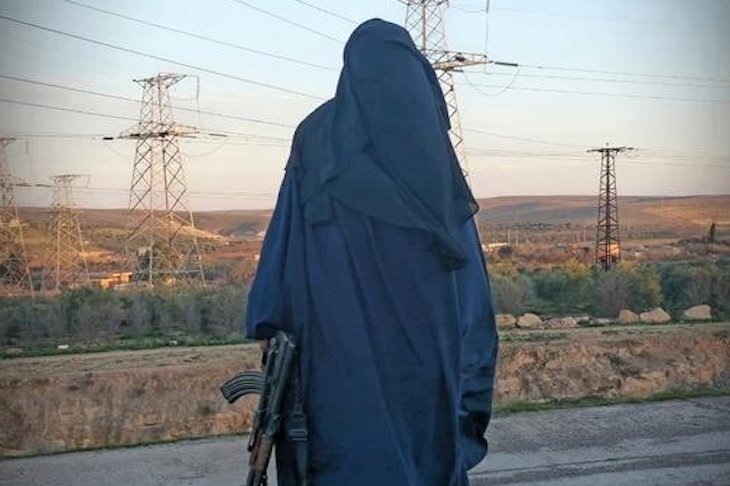Tooba Gondal, a notorious female Isis recruiter from Britain, was until Sunday a captive in the Ain Issa camp in north-eastern Syria. Now that the camp has fallen amid the chaos that is unfolding in the region, she is free again, as are hundreds of the other foreign denizens of the camp she was housed with. Her whereabouts are currently unknown.
In April the Rojava Information Center in Syria published an interview with Tooba Gondal in which she expressed her desire to return to the UK with her children. It is possible that this is now where she is headed. Gondal, 25, is wily, resourceful and tough – and probably in possession of a mobile phone. So who knows where she will end up? The British authorities should at least be prepared for her arrival (unless she rejoins her Isis comrades and disappears into the desert). Two things must happen if she does return: her children should be separated from her and she should be charged under existing UK terrorism legislation for joining a proscribed terrorist group and for promoting and glorifying terrorism.
The case against her is clear and unequivocal: Gondal went to Syria in early 2015, where she became a prolific recruiter and propagandist for the group, targeting women and girls, including, reportedly, Shamima Begum. Her favoured social media platform was Twitter, which she used for glorifying Isis’s most depraved acts of terrorism (most notably the 2015 Paris attacks) and for reaching out to potential recruits.
In an open letter published in the Sunday Times last month Gondal wrote:
‘To the British public first and foremost, I am not a terrorist. I have never harmed you, nor do I intend to… I was a vulnerable target to Isis recruiters. I was manipulated and persuaded that it was an obligation as a Muslim to travel to Syria. I never became a member of Isis… I want to prove that I am a changed person; a much better individual for society. I offer to help prevent vulnerable Muslims from being targeted and radicalised.’
It’s hard to know where to begin with this. Let’s start with the denial of agency. Gondal portrays herself as a victim, more sinned against than sinning. But far from being ‘vulnerable’ or ‘manipulated’, she was in fact a true believer in the Isis cause who not only joined the group with open eyes, but actively sought to bring others into its fold, including her younger sister who remains in London. She wasn’t vulnerable; she was a smart and fearless university student who not only made it to Syria unscathed but survived her three husbands and made it out of the Baghouz slaughterhouse.
Gondal’s letter is less an apology than a plea for leniency. There is no real acknowledgement of any wrongdoing, because there is no admission of her agency in joining Isis and her role in the group as an active propagandist and recruiter. In a recent ITV documentary, Gondal was briefly questioned by the daughter of the murdered British aid worker David Haines (he was beheaded in September 2014 by ‘Jihadi John’). ‘I can’t be held responsible in any way whatsoever, I was not part of… I didn’t give my allegiance to this Abu Bakr al-Baghdadi’, she said. Her tweets, which I have assiduously documented over the last few years, tell a very different story:




In minimising her responsibility, Gondal sounds like many of the other western Isis women who now ludicrously claim that they were hoodwinked, misled or ‘groomed’ into joining the group. Shamima Begum, for example, has said that she was ‘brainwashed’. Recalling the period just before she left Britain, she told the Sunday Times journalist Anthony Loyd that she was ‘like, slightly depressed, I didn’t have a lot of friends, I wasn’t really connected with my family, I couldn’t speak to them about any problems I had, so it was just easy to manipulate me.’ The American Hoda Muthana, who joined Isis in November 2014, similarly insisted that she made a ‘big mistake’ in going to Syria and had misunderstood her faith. ‘I was brainwashed once and my friends are still brainwashed.’ she told the Guardian.
These women’s stories take the form of what the American sociologist Erving Goffman called a ‘sad tale’: ‘a kind of lamentation and apologia’ that a person deploys to account for his or her current ‘low estate’. ‘It is among convicts, “winos,” and prostitutes that one seems to obtain sad tales the most readily,’ wrote Goffman in 1961. ‘Lately, of course,’ Goffman observed in a footnote, ‘the psychological expert has helped out the profession [of sex work] in the construction of wholly remarkable sad tales.’
Alas, there is no shortage of experts and commentators on hand to help out the freshly contrite women of the Islamic State. They were ‘groomed’, they claim. They can be powerful ‘voices’ against extremism, others insist. There is scant evidence for either proposition. Yet Gondal, ever the wily operator, has weaponised them to the cause of saving herself. We shouldn’t fall for it.






Comments